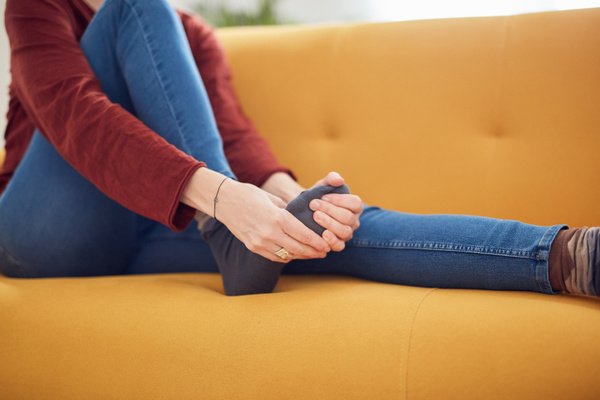Most Common Causes of Cold Feet and How to Prevent It
You may have cold feet, but not the nervous kind before a wedding. It's a constant battle with discomfort. We've all felt it when our toes rebel and go cold. From icy tiles to chilly winter nights, the struggle is real.
Don't worry! We're going to explore frozen foot mysteries and explain why they happen. Join us on a journey to get rid of the cold. Along the way, we also learn to stay warm and regain confidence in every step.
Let's bid farewell to this discomfort so we can enjoy our day-to-day activities without worry.
Most Common Causes of Cold Feet
Understanding the roots of this condition is essential for proactive care. So, in this section, we list the reasons behind it to bring awareness to individuals seeking solutions to this discomfort.
1. Poor Blood Flow
Insufficient blood circulation may cause your feet to become cold. When blood can't reach the feet, they feel very cold. Regular exercise is required to improve blood flow. Some exercises to consider include:
walking
yoga
cycling
swimming
ankle pumps
2. Underlying Health Conditions
Cold hands and feet can indicate health problems like diabetes or heart issues. These health issues upset the delicate balance needed to regulate the temperature in the feet.
Recognizing and addressing these health concerns is essential for proper care and treatment. Healthcare professionals will carefully assess your feet to diagnose and manage these underlying problems.
3. Stress
Beyond its psychological toll, stress can manifest physically, resulting in sweaty and cold hands. Sometimes, this physiological response extends to other body parts, including the feet.
You can employ some easy yet effective techniques for cold feet treatment. Engaging in fun and soothing activities such as meditation, yoga, or deep breathing exercises is just one.
4. Underactive Thyroid
When the thyroid is not working properly, it affects how our feet stay warm or cool. This disturbance results in a persistent cold sensation.
Medical professionals may schedule a comprehensive evaluation to know if you have thyroid issues. They recommend certain procedures to warm the feet and address the thyroid problem.
5. Medicine Side Effects
Certain drugs can make your feet feel cold, especially medications that affect blood flow. If you suspect your medicine gives you a cold sensation in your feet, ask your doctor. They can prescribe different medications to avoid harm.
6. Poorly-Fitted Footwear
Wearing shoes that don't fit properly is a common but often underestimated cause of this health condition. Ill-fitting shoes can lead to various issues affecting foot comfort and temperature regulation.
When shoes are overly tight, they can compress blood vessels, impeding the natural flow of blood to the feet. Hence, choose to wear comfortable footwear.
How to Prevent Cold and Sweaty Feet
Taking care of your feet is important to keep them comfortable and healthy. Let's explore some easy and relatable steps to keep your feet warm and dry.
1. Avoid caffeine.
Reducing caffeine is like giving your feet a breath of fresh air. Caffeine constricts blood vessels to slow blood flow, making your feet chilly. Avoid caffeine, especially before bedtime, to keep your feet at the right temperature.
2. Exercise.
Regular physical activity improves blood circulation. Exercise keeps your feet warm and prevents too much sweating. It's a simple yet powerful way to avoid cold, sweaty feet.
3. Get treated for underlying conditions.
If your feet are giving you a hard time, it might be a sign of something deeper. Get advice from a medical professional to know and treat underlying health problems causing you discomfort.
4. Avoid smoking.
Smoking makes your blood vessels smaller, so your feet get cold and sweat. When you quit smoking, not only do you improve your health, but you also keep your feet warm and dry.
5. Move around.
If your feet are cold, it's important to keep them moving. Even a little movement can go a long way in improving circulation and keeping your feet warm. So take a short walk and wiggle your toes. Better yet, stretch to get your blood flowing and keep those chilly feet at bay.
6. Wear socks and slippers.
Choosing the right footwear is like giving your feet a cozy hug. Opt for breathable socks that whisk away moisture, preventing sweat buildup. When indoors, slip into slippers with proper ventilation for a comfortable foot environment.
7. Stay Hydrated
Proper hydration is another way to prevent cold feet and hands. Ample water intake maintains overall blood circulation, ensuring warmth in your extremities. Staying hydrated helps your body distribute heat so your feet and hands stay warm in the cold.
8. Use Foot Creams
Nourish your feet and boost circulation with specialized foot creams. These creams have peppermint or ginger to moisturize and create warmth. Establish a nightly foot care routine to keep your feet soft and warm.
9. Invest in Customized Orthotics
Tailor your footwear for warmth and comfort by investing in customized orthotics. If your feet are cold, these special inserts help warm them by adding extra insulation.
Step into Comfort with Prime Foot and Ankle Specialists
Elevate your foot comfort with Prime Foot and Ankle Specialists. We have solutions for various foot-related conditions.
Our team specializes in personalized care. We provide comprehensive treatments to bring warmth back to your steps. We are here to help you have healthy feet and find long-lasting relief.
Don't let any condition limit your mobility. Take the initiative — schedule a consultation today. Prime Foot & Ankle Specialists will help you find warmth and comfort for your cold feet. Step into a future where each stride is confident and cozy. Your journey to warmth starts here!


